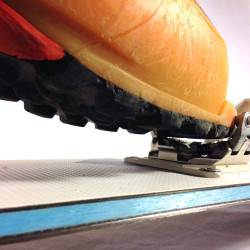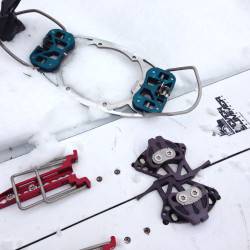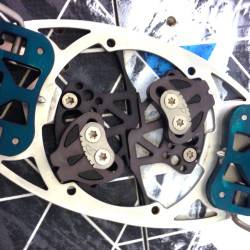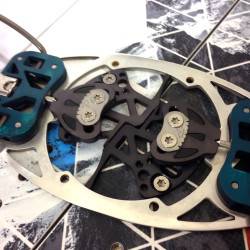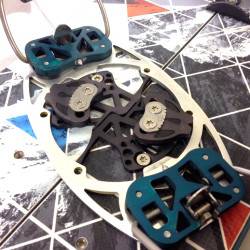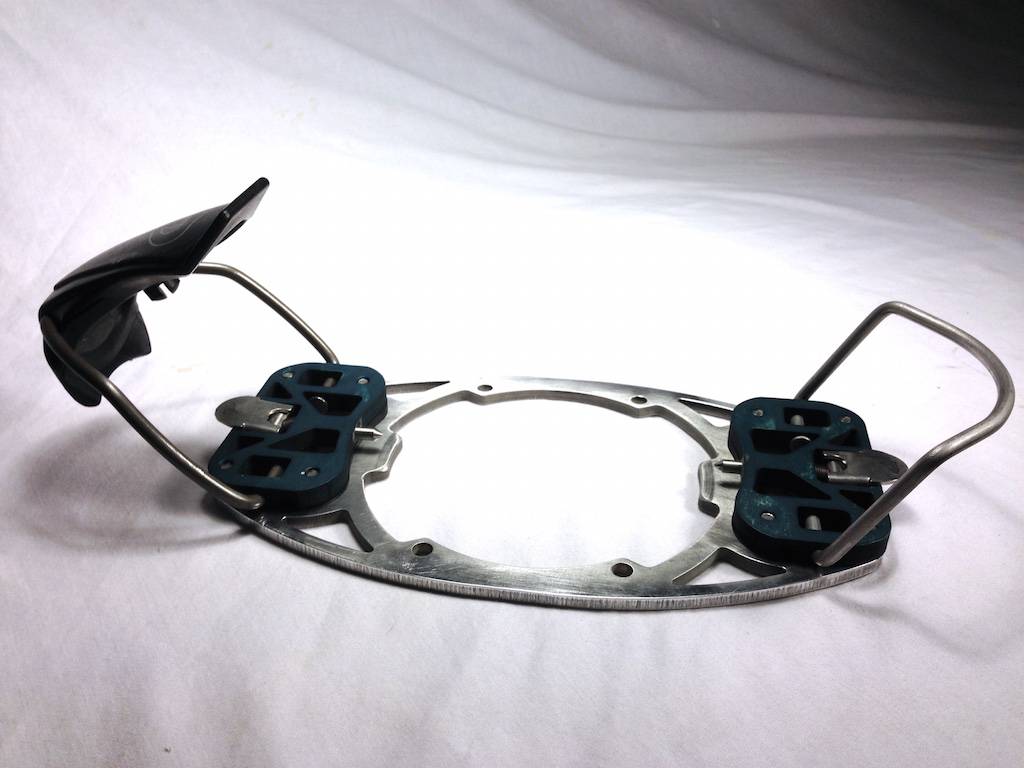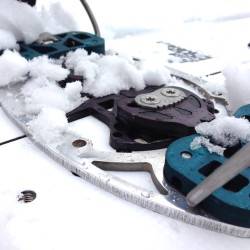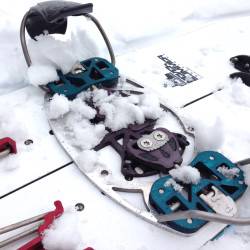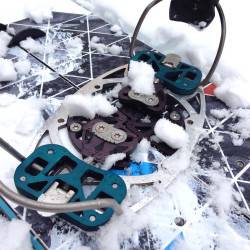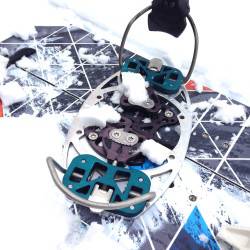Gear Review: Phantom Splitboard Bindings
Phantom Splitboard Bindings
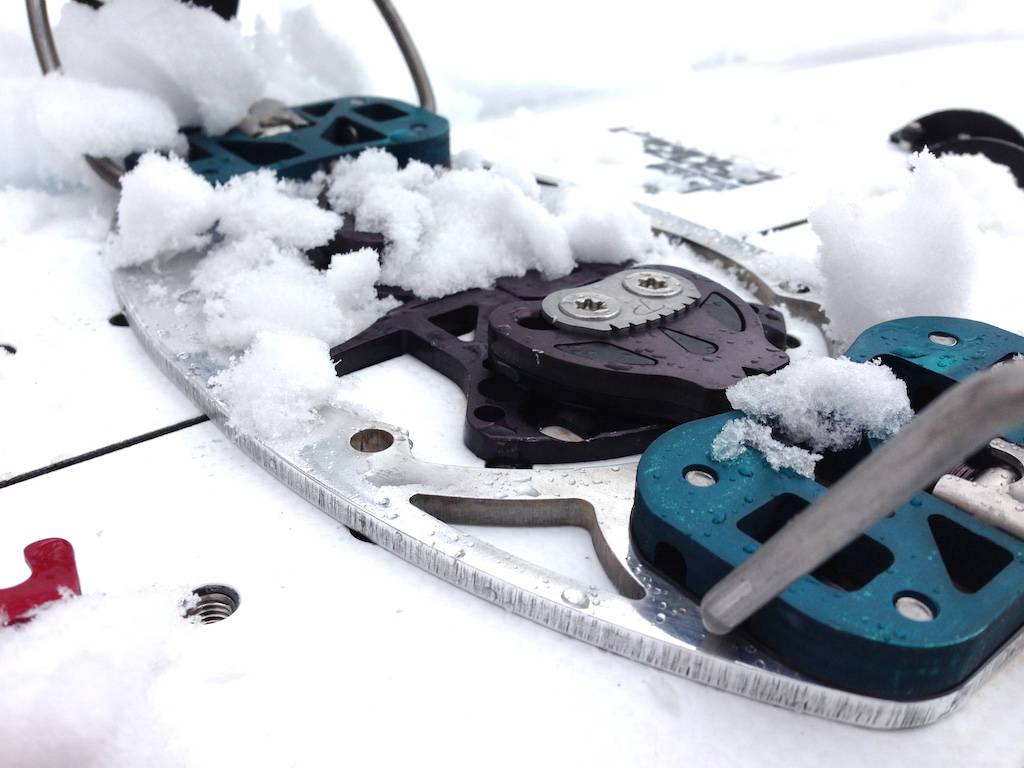
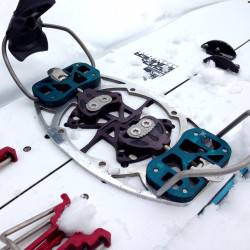
Phantom bindings are used in conjunction with an Alpine Touring (AT) boot. The binding draws from the many advantages of an AT boot such as the stiff sole, tech toe connection point, and the lugs at the toe and heel. Yet, AT boots ride like a stiff soft boot due to the pivoting upper cuff.
Technical Features
- Lightweight
- Minimal parts
- Snow shedding binding design
- Boot sole resides closer to deck
- Powerful and responsive edge control
- Durable
Tour Configuration
- Instead of touring with an entire binding attached to the boot, Phantoms stow in pack during tour mode and rely on the AT boot’s tech toe piece for touring. The stowed bindings weigh less than 900 grams combined.
- Ergonomic Dynafit touring is more efficient with fulcrum at the toe.
Ride Configuration
- Easily transform to ride mode
- Deicing / snow-shedding binding design
- Scattered weight offers torsional flex
- A more rapid release encase of an emergency
Carry Configuration
- Slim design due to minimal parts while uptracking or caning
- Less bulk and material while trekking in for springtime approaches
Binding are canted inwards roughly 3 degrees providing a more ergonomic stance.
Spring-loaded lockout tabs reside beneath the boot sole in ride mode offering a double locking lever pin.
Bail design is pre-adjusted for rapid step in to AT boots. No ratchets or binding straps to adjust each time.
Design
- High quality engineering and design
- Anodized aluminum (available in different color combinations)
- Excess weight from binding material is shed using negative design space.
Construction
- Extremely high tolerance parts
- Minimal plastic (binding cants & toe bail)
- Made from one of the strongest aluminum alloys available.
- Bindings alone weigh less than 450 grams each
- (see comparison weight chart below)
Background of progression to Phantom Splitboard Bindings
The Phantoms are a complete game changer in alpine touring (AT) splitboard bindings. Just like a Dynafit brought the ultimate tech binding to the AT ski world, Phantoms bring the same solution to the table for AT splitboard setups. Plain and simple, the Phantoms are engineered by completely rethinking the touring and ride transformation. To start, Phantoms completely eliminate the traditional Voile puck interface, allowing the biding to mount much closer to the deck under foot. In terms of physics this makes all the difference in the world. Imagine transferring lateral A physical energy that can push or pull on something. Your weight is the force that you push on the earth with, when there are no other accelerations." class="glossaryLink " target="_blank">force higher on the deck as opposed to closer on the deck.
The puck system transfers force in a rectangular pattern from the boot, to the slider plate, and eventually to the puck. The shape and width of the Phantoms scatter force more efficiently due to the shape and wider footprint which transfers force from the cleat to the binding plate. The difference is beyond words.
Phantoms work flawlessly with the dynamics of an AT hardshell boot, and offer all the advantages of touring, side-hilling, and boot-packing in an AT boot. This is especially important on steep approaches while kicking steps. AT boots also accept a crampon with minimal effort using the lugs of the AT boot design. Phantom bindings offer control and contouring when riding on the descent that is equivalent or better than a snowboard soft boot.
Just how easy is the transition from tour to ride mode? Check out this video from Jason Bushey.
Touring
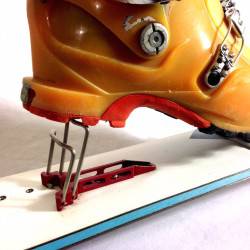
Touring in an AT boot with a Dynafit toe piece is the most efficient mode of touring. Touring in an AT boot relies of just the fulcrum of the boot toe-piece with a Dynafit connection. Essentially the boot is merely hinged at the toe while touring allowing for maximum efficiency during glide. This is in contrast to binding systems that stay connected during touring, where one had to lift and pull the entire binding in tour mode. Phantoms merely stow in the pack on the ascent, and touring is performed only with the tech toe-piece.
There are a few different options for the touring setup; Phantoms are available with Dynafit Speed Superlite with a Phantom adapter to match the existing hole pattern on your deck. The package setup, available from Phantom is called the Alpha Tour which includes two tech toe pieces, two adapter plates, and two Phantom risers. Alternatively, you can use other types of tech toe pieces in conjunction with the Sparks R&D adapter.
The Phantom Rocket Dual Risers are designed to take up less real estate than other climbing wires, and still fit the existing hole pattern placing the sole of the boot on the heel of the boot without the need for a Sparks adapter plate (without this adapter on an AT setup, the climbing wires will strike on the arch of the foot during touring due the longer mondo and BSL length of an AT boot). Additional the Phantom Rocket Dual Risers have slotted rails to lock down the rear heel.
There are two main components to the Phantom binding system; the binding and the cleat.
Bindings
When touring with Phantoms, the binding plate is removed and stowed in the pack. I hardly notice the weight, the Phantom binding weighs just 450 grams each. The previous system I migrated from weighs nearly double that! Transforming to ride mode is a piece of cake, and the difference in torsional flex and initiating turns is just amazing. The bindings also have a three degree cant built in to the binding. Canting is a slight tilt on the footbed of the binding inward providing an ergonomic stance while riding.
Cleats
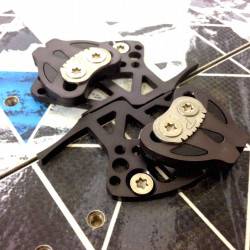
Opposing cleats are mounted to the board deck with spring-loaded locking level pins in the binding during ride mode. The cleats weigh in at just 72 grams each. They are adjustable from +30 to -30 degrees, and stance width adjustment is in ½” increments.
A lot of thought, engineering, and physics have been put in to function and design. The lock down to the cleats resides beneath the boot sole, so no accidental release could possibly happen. Likewise the tolerances between the binding plate and cleats make for a much easier time in the transformation from tour to ride mode.
|
Weights compared |
Phantom
Alpha Ride
|
Voile
Mountain Plate
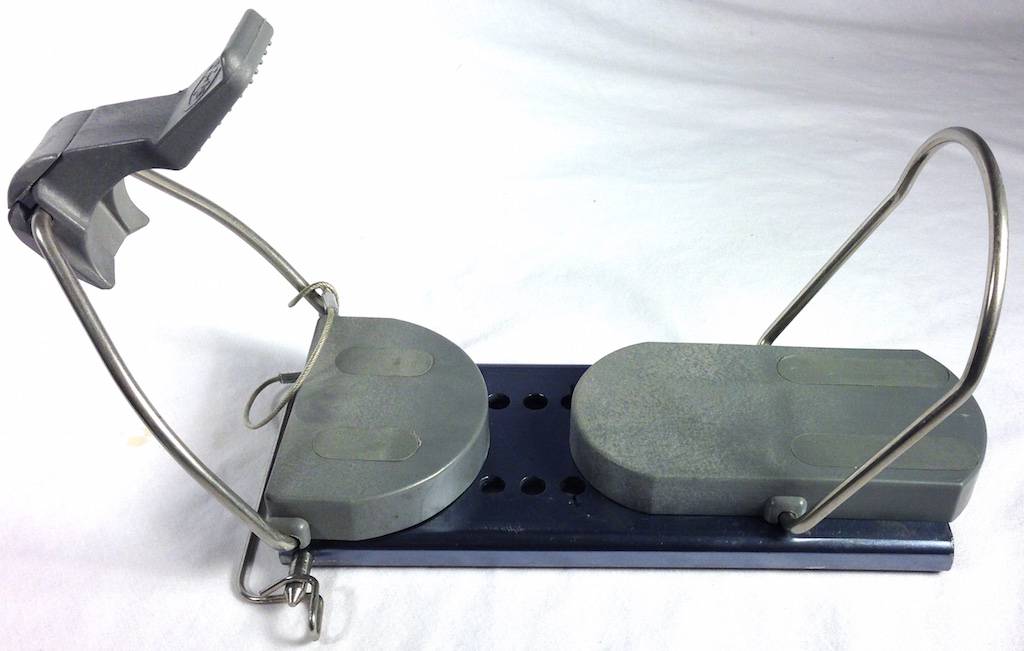 |
Trench Digger II
(modified)
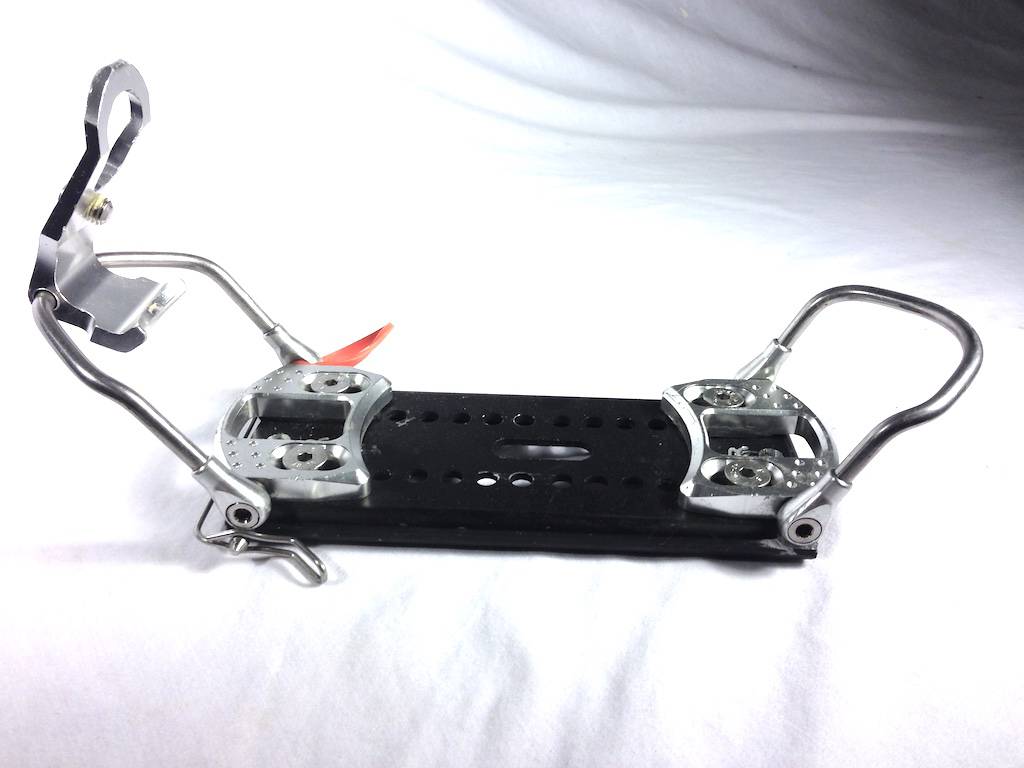 |
||||
| Phantom Binding (each) |
✓ |
450g | |||||
|
Plate Binding (each)
|
✓ |
322g
|
✓ |
301g
|
|||
|
Slider Plate & Pin (each)
|
✓ |
250g
|
✓ |
250g
|
|||
|
Universal Pucks (each set)
|
✓ |
152g
|
✓ |
152g
|
|||
|
Phantom Cleats (set)
|
✓ |
72g
|
|||||
|
Voile Heel Risers &
Sparks R&D Adapter (each)
|
✓ |
102g |
✓ |
102g | |||
|
Phantom Heel Risers (each)
|
✓ |
84g
|
|||||
|
Total System Weight
|
1212 grams | 1652 grams | 1610 grams | ||||
|
Binding Weight In Pack
(while touring)
|
900 grams | 1144 grams | 1102 grams | ||||
* Weights assume typical AT boot setup systems. Soft boot setups would add the additional soft binding weight as well. This is especially prevalent during when uptracking, caning, bootpacking, or carrying the entire setup on steep approaches.
On the snow
The overall difference from migrating to the Phantom setup has just been phenomenal. Initiating turns in both powder and pack has been flawless. The difference of having the boot sole closer to the deck makes a world of difference. Edge control down the steeps is completely amazing. Transition times from touring to ride modes is much more efficient. Phantoms have made a huge difference in virtually every condition.
In essence, Phantom bindings are a revolutionary approach to AT splitboarding. They utilize all the advantages of backcountry riding and touring with an AT boot, while still providing the ride and feel of a soft boot.
Phantom splitboard bindings are available from phantomsnow.com
Phantom Alpha Ride – $575
(2) Bindings, (2) Set of binding cleats
Phantom Alpha Tour – $375
(2) Dynafit Speed Superlite toe piece, (2) Dynafit adapters, (2) Phantom Rocket dual risers

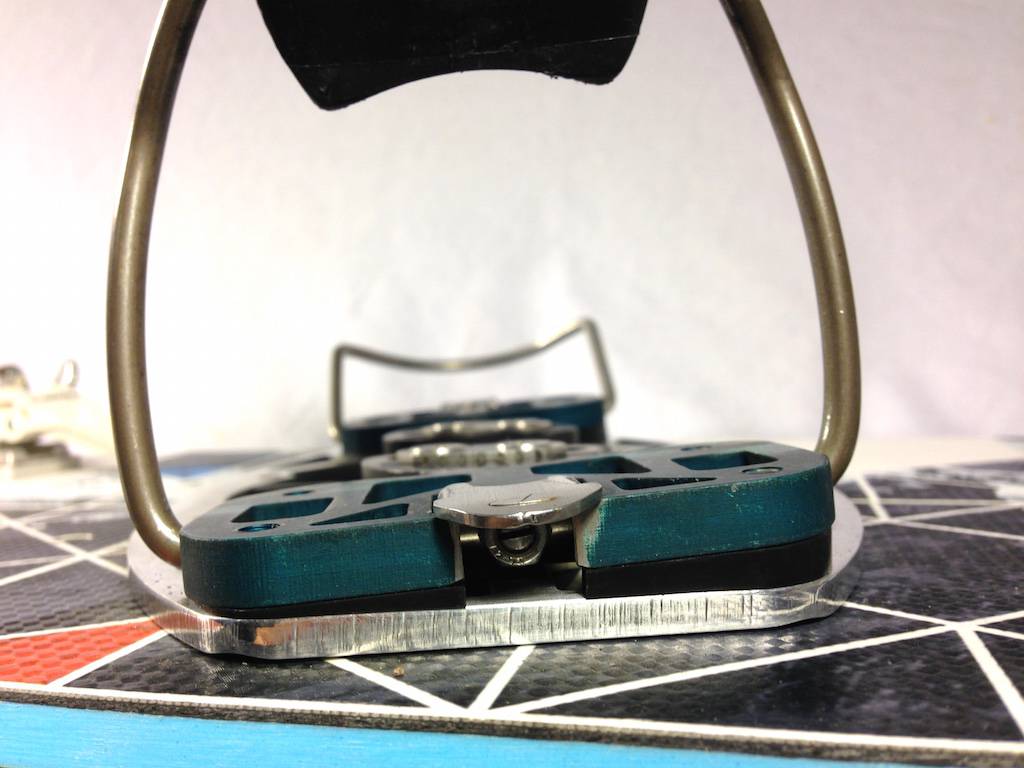
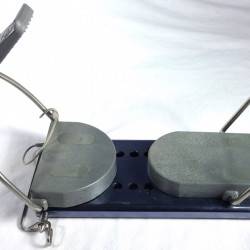
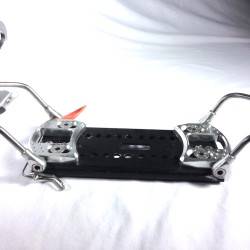
![[Left] Traditional Voile, [Right] Phantom](https://www.snowboardmountaineer.com/wp-content/themes/jgbs2b86dpfctjt4qvxpuk54963/files/wp-content/uploads/2015/05/IMG_6105-250x250.jpg)
